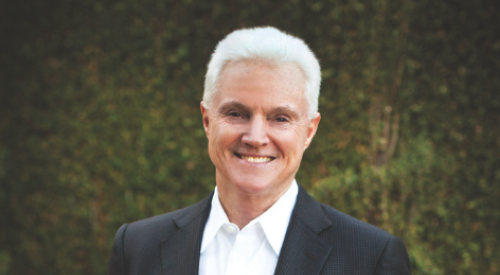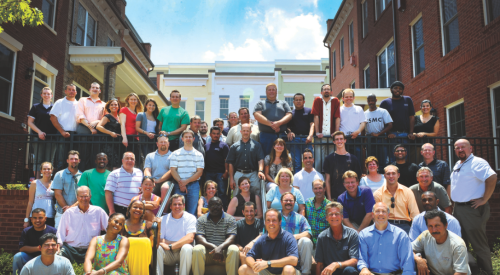|
Some builders deride the National Housing Quality Awards concepts of mission statements and core values. They don't have much influence, they argue, in the daily management and execution of a home building company. But it is exactly these attributes combined with definitive leadership that allowed T.W. Lewis to be a solid survivor in the toughest home building market since the 1930s, while others fall to the wayside. In the process the company also earned the National Housing Quality Gold Award.
It's no surprise that Tom Lewis, founder of the Tempe, Ariz.-based move-up builder, has led his company to this achievement. “The day we started the company [in 1991], our focus was to be the best home building company in America as measured by product quality, customer satisfaction and profitability.” Lewis is quoting the company mission statement, and that is something the leadership team does regularly. The mission statement is top of mind and a driving, living force that directs them in their decisions.
 |
|
The T.W. Lewis leadership team kept true to its core values, and today the company is still running strong. From left: Pat Adler, vice president, purchasing, acquisitions, development; Gina Self, vice president and CFO; Tom Lewis, owner and CEO; Joe Gilian, vice president, sales; and Kevin Egan, president and COO. Photo: Reed Rahn/Getty Images |
“That was a big vision for a start-up company,” he says, “but it spoke to the history I had in home building. Product quality was a differentiator. Customer Satisfaction? I'd spent way too much time talking to unhappy customers. Profitability? We virtually had no equity, so a strong company had to come through profitability. I also saw in that something that would inspire people.” Lewis also likes the tension among these three goals. You can't sacrifice profitability with total devotion to over-the-top quality, for example.
Kevin Egan, who took the role of president and COO four years ago, echoes Lewis. When Egan arrived, he found a company with a great backbone. “The reason we've been successful is it starts with our mission and our vision,” he says. “We're disciplined in our processes and operations, setting goals and objectives and tracking Key Performance Indicators and communicating that information.”
In spite of that strength, Egan found room for improvement in processes. For example, he focused on customer satisfaction. “The biggest thing that has improved is how we serve our customer. We're much better at serving customers with the right attitude and consistently between our departments. Our customers hear the same thing, get the same level of service and follow-through and teamwork.”
Pat Adler is vice president for purchasing, acquisitions and development. He provides the measurement that proves the increased focus on consistent communication with customers pays off. “We have a 33 percent referral rate,” he says. “People may not be our customers now, but in their minds they are our customers.”
How does T.W. Lewis deliver loyalty to their customers and their future customers? Adler explains. “One of our first rules is: 'If it's wrong, we'll fix it. If it's right, we'll explain it. If it's in the gray area, we'll talk about it.”
Continuing, he says, “We resolve all customer issues individually. There are different circumstances around different customers, so many builders fall in the trap that if they do it for one, they have to do it for all.”
That flexibility allows the team to deliver customized satisfaction, meeting the buyer's needs. Combined with consistent communication, such a loyalty program delivers big bonuses.
A mission statement can provide a guiding light for a company, but it doesn't ensure success. Many companies with specific and dynamic mission statements are sitting on the sidelines now because they lacked the core values to see them through the good times and the bad.
The lesson from T.W. Lewis is that those core values are probably more necessary in the good times than in the bad. The company defines its core values as honesty, hard work, integrity, achievement, reliability and compassion. Many companies adopt similar values, but T.W. Lewis differentiates in a couple of ways. The most significant, says Lewis, “Is we care more about quality than quantity.”
During the upturn in the housing industry, all of those values and beliefs were tested by market pressures. “One of our most brilliant decisions,” says Adler, “was to pace sales. If everybody had done the same, things would have been a lot better.”
Egan explains that in 2005, when the company closed about 300 homes per year, the pressure to sell more homes and, consequently, increase production was substantial. “We had a master-planned community called Valencia that opened in 2005,” he says. “We had four product lines and a trailer. We had a hundred people in almost every one of those communities wanting to buy houses. We couldn't build that many and still maintain quality. It's tempting when you're raising prices $10,000 per month and more and more people keep showing up. At the end of the day, we still have to operate. We still have to execute.”
That discipline to hold to their core values had a significant impact. The last land acquisition the company made was in 2004. “It's one of the smartest things we've done,” says Egan. “And has made the most significant impact financially and given us the ability to withstand this downturn.” Land prices skyrocketed, and Adler continued to evaluate deals, but they never made sense in the equation the company had. Since they didn't exceed their capacity during the run up, Egan explains, “We had a pretty good stockpile of land and lots. We tried to pace ourselves through our land inventory.” Egan credits Lewis for that vision — that leadership.
Lewis also exhibited leadership outside the company and within the community. In 2001, he established the T.W. Lewis Foundation, which impressed all the NHQ judges. The company contributes 10 percent of its pre-tax profits, and today the foundation has close to a $15 million endowment with a goal to reach $20 million. “It throws off about a million dollars per year in funds to make charitable gifts,” Lewis says.
Among those gifts are a large contribution to the University of Kentucky, where Lewis received his undergraduate degree and an endowed chair at the University of North Carolina where he completed graduate work.
But what gets he and his wife excited is the local scholarship program. Every year, they select about 10 students from the best and the brightest in the Phoenix area. Their goal is to give lower middle-class kids an opportunity at the highest level of education. With scholarships that run approximately $5,000 per year, the program has helped about 70 kids make the leap to the best schools. “Our scholarships,” Lewis says, “helps them make the difference between an average school and a great school. We have 4 or 5 at Harvard. One at Brown. One at Penn. One at Stanford. One at Duke.”
The foundation will continue because of the discipline, leadership and focus Lewis and his management team exert over the day-to-day operations of T.W. Lewis. The result is an excellent company surviving the downturn, employee pride in their product and their place in the community, and a National Housing Quality Gold Award.
|











